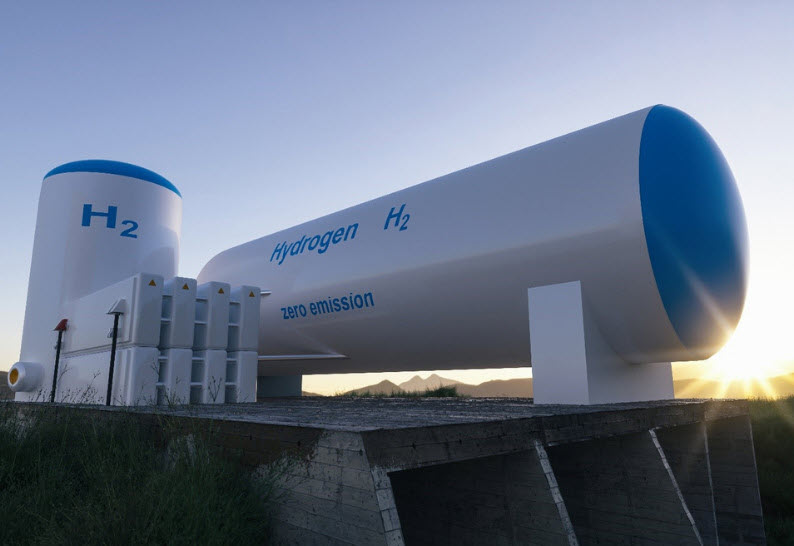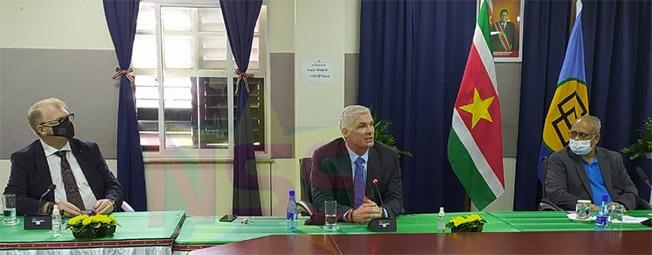
The government has signed an agreement with the Hybrid Power System Group (HPSG) from Denmark for the construction of a ‘hydrogen power plant’. 100 megawatts of energy will be produced for Suriname, a press conference announced.
The water from the Commewijne River will be used to produce hydrogen (hydrogen), industrial oxygen and clean water. The power required for this process will come from solar energy and wind turbines. But according to a press release from HPSG itself, it will produce 719 megawatts of energy with the power station. Power will also be exported to French Guiana.
The complex will be located on the Breedevoort plantation in Commewijne and must be up and running by 2023. HPSG is the first to make a ‘foreign direct investment’ in Suriname, Minister Armand Achaibersing of Finance and Albert Ramdin of Foreign Affairs, International Business and International Cooperation (Bibis) share. The Danes are going to invest US $ 1.2 billion. The project will not cost Suriname anything, and the necessary land is also no problem: the initiators of the project own plantation Breedevoort.
In recent years, there has been a diligent search for new and cleaner forms of energy. Hydro-power (electricity generated with water), solar and wind energy predominate. Although hydrogen has been seen as “energy of the future” for much longer, it has still not broken through to replace ‘fossil fuels’. Hydrogen is the only element on Earth that occurs everywhere. One of its characteristics is that it can store energy. It also serves as a raw material for chemical products such as ammonia for fertilizers and synthetic kerosene. Cars that run on hydrogen are more expensive to purchase. Refueling with hydrogen is also more expensive. It is best used on larger means of transport (synthetic jet fuel for airplanes) but it is not cheaper.
Traditionally, hydrogen is extracted from coal and natural gas. But these processes release carbon that is harmful to the environment. One way to produce it carbon-free is through a method called electrolysis. The water (element H2O) is treated with electric pulses. This releases pure hydrogen (H), oxygen (O2) and vapor. This is also not a cheap process because it requires an enormous amount of electricity. HPSG will generate this power with wind turbines and solar energy.

Ramdin, Achaibersing and fellow Natural Resources Minister David Abiamofo emphasize that a good deal has been reached. The ‘pioneer project’ of the Danes will bring many benefits to Commewijne. Areas will be opened up with the construction of a 12 km street to the place where the complex will be built. There will be a new district commissioner. There will also be a multi-million fund for projects for the whole country. The Danes are bringing 100 buses that run on hydrogen. They will also build the infrastructure where they can refuel. There will be a chair at the Faculty of Technology at Anton de Kom University. A ‘science center’ will also be set up. 600 people will find work immediately when the ‘hydrogen plant’ is finished. Suriname can earn ‘carbon credits’ (earn money by keeping carbon emissions below a certain point). There will be a close collaboration with EBS, knowledge will be shared. After all, it is a new technology. When the time comes, HPSG will build a 50 km transmission line to export power to French Guiana.
Falk notes that the company has chosen Suriname because of its geographic location. Land is also cheap, he says. In combination with their working method, the production of hydrogen and energy will become profitable and profitable, he says. Falk announces that the investment is making a big statement. “With this we want to indicate that it is good investment in this country. Come on. ” Little information about the company can be found on the Internet.
Source: starnieuws.com
Read the most up to date Fuel Cell and Hydrogen Industry news at FuelCellsWorks




